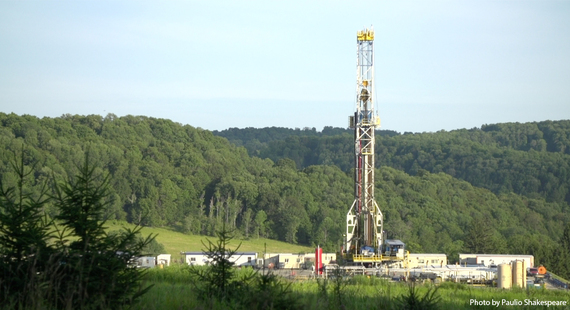In the wake of New York's historic decision to ban fracking, Secretary of the Interior Sally Jewell took a broad swipe at local efforts to bar the dirty drilling practice, including the following: "I think that localized efforts or statewide efforts in many cases don't understand the science behind it and I think there needs to be more science."
Jewell's reaction is troubling for a number of reasons -- not the least of which is the temerity of a top official going beyond her purview to criticize local efforts to protect public health.
But it's especially vexing that the secretary chose to invoke science in her critique. In fact, a significant body of scientific evidence is emerging that demonstrates that fracking is inherently dangerous to the environment and human health.
Scientists are only beginning to understand the full impact of shale gas development on air quality, water quality, agriculture, and human populations. In part due to industry secrecy, the research still lags behind the rapid expansion of fracking across our country. But recent analyses from Concerned Health Professionals of New York and Physicians Scientists and Engineers for Healthy Energy confirm that peer-reviewed data show far more evidence of the dangers of fracking than not. Gov. Andrew Cuomo banned fracking in New York state last month only after his health commissioners reviewed the same science and came to the same conclusion: not worth the risk for the people of the Empire State.
So, what exactly does the science say are the harms of shale gas development?
Water contamination. From the injection of cancer-causing chemicals underground at the beginning of the drilling process, to the methane gas sprung loose that can leak into groundwater supplies during the process, to the sometimes-radioactive wastewater that emerges to the surface at the end of the process, fracking poses incredible risks to our water supplies. Our research has uncovered more than 1,000 cases of water contamination linked to fracking by state officials. PSE Healthy Energy determined that 72 percent of peer-reviewed studies found an "indication of potential, positive association, or actual incidence of water contamination."
Air pollution. Even more damning for the fracking industry, a full 95 percent of the studies examined by this same group of scientists found that shale gas development increases air pollution. It's easy to see why. Fracking produces air pollution from the well bore as the well is drilled and gas is vented or flared. Emissions from trucks carrying water and materials to well sites, as well as from compressor stations and other fossil fuel-fired machinery, also damage air quality. Well operations, storage of gas liquids, and other activities related to fracking add to the pollution toll.
Sickness. People who live close to fracking sites are exposed to a variety of air pollutants including benzene, xylene and toluene. These chemicals can cause a wide range of health problems--from eye irritation and headaches to asthma and cancer. Exposure to contaminated water increases the risk of cancer and reproductive or developmental health problems. Nearly all of the research to date shows that fracking has significant potential to cause -- or has already caused -- damage to human health.
Of course, if you're an oil or gas company focused on your bottom line, you oppose what Jewell and others call a "patchwork" of regulations designed to protect drinking water and public health, because they increase your costs. But if you're a government official, charged with protecting the health and well-being of the constituents in your state or town, the science weighs heavily toward a ban.
The secretary's comments come as her agency deliberates rules to govern fracking on federally-owned public lands. Yet even as fracking proponents criticize state and local action, they have consistently opposed any meaningful efforts to curb fracking damage on a federal level. This week Sen. Orrin Hatch (R-Utah) introduced a bill that would leave regulation of the industry on federal lands to the states. Since the senator once called efforts to mitigate negative impacts of fracking "pathetic," I fear he wants local control because he believes Utah will be more lenient on the frackers than the feds, not the other way around.
Sen. Hatch may be happier with Jewell's rules than he expects. The current rules proposed by her department do little more than ask the industry to tell us what chemicals they are using on our public lands and adhere to at least some of the industry's own standards for well construction.
The bottom line: if Jewell really wants policy to be driven by the science, she should read the mountain of recent health studies that point to fracking's harms. If she did, she would have to heed the call to ban fracking on public lands, rather than the very weak rules she is considering now.

